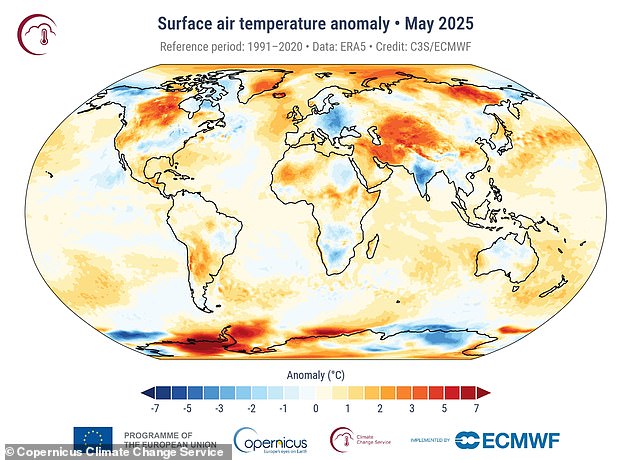
Second-Hottest May on Record: Global Temperatures Reach 15.79°C Last Month
May 2025 Second-Hottest on Record as Climate Trends Intensify
May 2025 marked the second-warmest May globally, with average temperatures hitting 60.42°F (15.79°C)—0.95°F above the 1991–2020 baseline, according to the EU’s Copernicus Climate Change Service (C3S). While slightly cooler than May 2024’s record of 60.6°F (15.91°C), scientists warn human-driven greenhouse gas emissions continue to fuel alarming trends.

Global heat extremes in May 2025 compared to 1991–2020 averages (Source: C3S)
Relentless Warming
This follows a pattern of record-breaking heat: 2024 was the hottest year on record, featuring the warmest summer, January, and April. Of the past 22 months (excluding July 2024), all exceeded 1.5°C above pre-industrial levels. May 2025 was 1.4°C warmer than 1850–1900 averages, a brief dip but still near critical thresholds.
“While May offers a respite, we expect 1.5°C breaches to resume soon,” said Carlo Buontempo, C3S Director.
Regional Contrasts
Europe saw mixed conditions: cooler in the east (Italy, Finland) and warmer in the west (UK). Britain experienced its sunniest, warmest spring since 1884, with parks packed in London (below).

Sunbathers in London’s St James Park, May 1, 2025
Globally, extreme heat struck western Antarctica, the Middle East, and northern Canada, while India, Alaska, and Australia saw below-average temps.
Oceans and Ice
Sea surface temperatures (SSTs) averaged 69.42°F (20.79°C), just shy of 2024’s record. Arctic sea ice was 2% below average—the ninth-lowest May extent in 47 years.

Rainfall Shifts
Europe’s spring saw wetter conditions in Scandinavia and drier spells in central regions. Globally, western North America and Australia faced drought, while eastern North America and Russia saw heavier rains.
Hottest Mays on Record
- 2024: 60.6°F
- 2025: 60.42°F
- 2020: 60.31°F
- 2016: 60.22°F
- 2023: 60.18°F
The Greenhouse Effect
Fossil fuel use traps heat via CO₂ emissions, intensifying global warming. Reducing emissions remains critical to curb rising temperatures.

Coal-fired power station in Indiana, a major emissions source
With 2025 poised to break more records, experts urge urgent climate action to mitigate escalating impacts.
Further Reading: Carbon Emissions Explained


